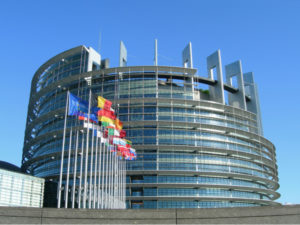Originally posted on May 29, 2019.
The EU held parliamentary elections this weekend, and there are many compelling story lines from many of the different countries. But one theme remained constant over much of the continent: the rejection of globalist establishment parties. I have seen it in Paris with my own eyes. The Yellow Vest protesters I saw weren’t angry at one party or another, they were upset with the entire globalist establishment that has run France, the EU and most of the world for decades. Here’s how their anger played out in the EU’s major parliamentary elections:
The Establishment Gets Bruised
Europeans from both the right and left of the political spectrum rejected centrist parties old and new.
- In France, Marine Le Pen’s National Rally party defeated President Emmanuel Macron’s La Republique En Marche (LREM), with 24 percent of the vote, vs. LREM’s 22.5%.
- In the UK, Brexit was the main focus of voters. The brand-new Brexit Party won 32% of the vote. The Liberal Democrats came in second with 20%. The Labour Party had been hoping for a strong showing but was deeply disappointed with only 14%. The Greens produced much stronger results than expected with 12%. The Tories were almost completely forgotten with 9%. Both of the long established parties of the UK, Labour and the Tories, were abandoned by supporters.
- In Sweden, the anti-immigrant Sweden Democrats gained ground, capturing 15.4% of the vote.
Greens Grow
Green party growth was apparent in many countries where they took votes from establishment parties.
- Discontent with the establishment parties in Germany drove voters to increase their votes for the Greens and the Alternative for Germany, both up from 2014 in the voting.
- In Finland too, Greens surged in the country’s polls, winning 16% of the vote.
- In Ireland too Greens gained ground on the leading parties.
Nationalists and Populists are Rewarded
In countries where anti-establishment parties already controlled government, they were rewarded by the people.
- In Italy, voters were most worried about immigration, and rewarded the euroskeptic, anti-immigration League party (already part of the country’s governing coalition) the lion’s share of the vote with 34%. That’s up from 6% in 2014’s EU parliamentary elections.
- In Poland and Hungary, nationalist governments increased their representation in the EU parliament after grateful citizens rewarded the parties for their focus on the people.
- Despite a recent scandal involving a coalition partner that drove chancellor Sebastian Kurz from power, Austria’s People’s Party won the country’s EU parliamentary election with 35% of the vote.
Where the Socialists Won
- In Spain, there was anti-establishment feeling of a different flavor. Socialists were able to dislodge the country’s Popular Party, winning 33% of the vote.
- In Portugal, the ruling Socialist Party was bolstered by a win in the EU parliamentary elections.
Where Socialists Lost
- In Greece, the conservative New Democracy Party trounced the ruling socialist Syriza party.
All around the EU, establishment parties of both right and left wing politics suffered at the hands of outsider parties.
The same anti-establishment feelings are apparent in the United States. Americans voting for Donald Trump weren’t voting for a Republican, they were voting against the establishment. American politicians should be watching the outcomes of EU’s parliamentary elections closely for signs of the anti-establishment mood.
You can read the official results here.
If you’re willing to fight for Main Street America, click here to sign up for my free weekly email.





